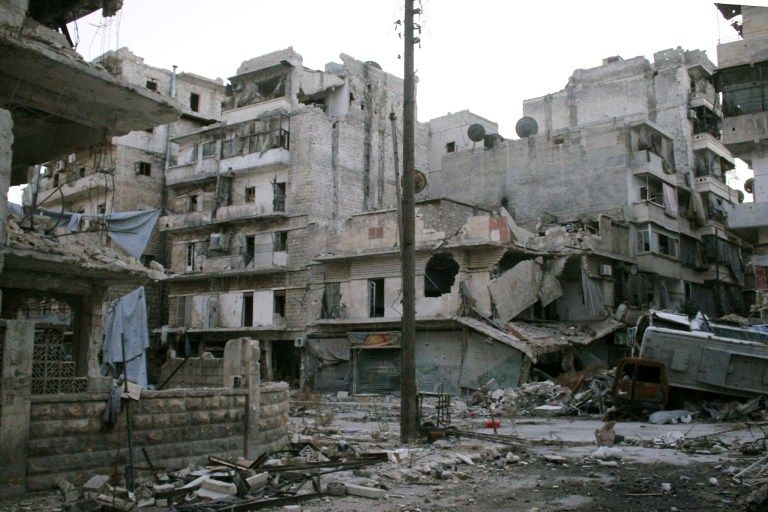SUMMARY
This is AI generated summarization, which may have errors. For context, always refer to the full article.

DAMASCUS, Syria – Syria’s regime captured from rebel fighters a key town near Lebanon on Monday, December 9, as doubts were cast on any breakthrough at a Geneva peace conference slated for next month.
France’s foreign minister, Laurent Fabius, downplayed the chances of a peace agreement being reached in Geneva, while expressing confidence the January 22 conference would go ahead.
But his British counterpart lamented the fact that after 1,000 days of conflict in Syria, more than 100,000 people have been killed, 2.2 million driven abroad, and 2.5 million cut off by the fighting.
“Today is 1,000 days since Syrians took to the streets calling for freedom. It is time to end the conflict in #Syria,” Foreign Secretary William Hague tweeted.
The conflict flared in March 2011 with peaceful pro-democracy protests inspired by the Arab Spring but escalated into a full-scale civil war after President Bashar al-Assad’s regime launched a brutal crackdown.
And the violence again showed no signs of abating on Monday, with a powerful storm forecast to make matters worse for Syrians, including those who have sought shelter in neighboring countries like Lebanon and Jordan.
The Syrian Observatory for Human Rights said regime forces regained control of the strategic Damascus-Homs highway after seizing most of the town of Nabak in the Qalamoun region.
The army has been fighting for weeks to secure the Qalamoun region, north of Damascus, in a bid to sever rebel supply routes across the nearby border with Lebanon.
But Observatory director Rami Abdel Rahman told Agence France-Presse that the army had secured most of Nabak, including all of the western part of the town adjacent to the highway.
Pro-government newspaper Al-Watan said the highway, essential to move troops and weapons and cement regime control from Damascus to the central province of Homs, would reopen soon.
The highway has been closed for about 20 days because of fighting that also prevented the delivery of fuel to the capital, Damascus, where shortages have taken a toll on daily life.
Al-Watan also quoted a military source as saying regime forces had killed or captured some 100 opposition forces in Nabak, and seized a large weapons cache.
‘Positive outcome unlikely’
The Observatory, which relies on activists and medics on the ground for its reports, has said the fighters from Lebanon’s Shiite movement Hezbollah have been battling alongside Syria’s army in the region.
Hezbollah has helped Syrian loyalist forces recapture other towns from rebels, including Sbeineh, an enclave south of Damascus, in November, and the key town of Qusayr near the Lebanese border in June.
On the diplomatic front, French Foreign Minister Laurent Fabius played down expectations that the peace conference dubbed Geneva 2 will yield any breakthrough.
“I believe that it will take place but… it is very difficult to imagine a quick positive outcome,” said Fabius.
“The Geneva conference — and I must say it’s no surprise — is taking place under very difficult conditions.”
There is still no certainty the UN-backed talks, which seek to put in place a transitional government, will go ahead.
The main opposition National Coalition has said it will attend with conditions, while some key anti-regime figures have refused and others have said no final decision has been made.
The opposition is insisting Assad play no role in Syria’s future – a demand flatly rejected by the regime.
On the humanitarian front, refugees who have sought haven in camps in neighboring countries braced for a harsh winter, particularly in Lebanon which was expecting a storm.
Lebanese authorities, with the help of the UN refugee agency, are mobilizing to protect thousands of refugees who live in makeshift, informal shelters, before snow and heavy rain hit on Tuesday night.
“There are a large number of informal camps… and quick action is required with the approach of the storm,” said Lebanese Social Affairs Minister Wael Abu Faour.
Abu Faour said authorities, working with the army and international aid agencies, had begun distributing plastic sheeting, wood planks, heaters and food to the refugees. – Rappler.com
Add a comment
How does this make you feel?
There are no comments yet. Add your comment to start the conversation.